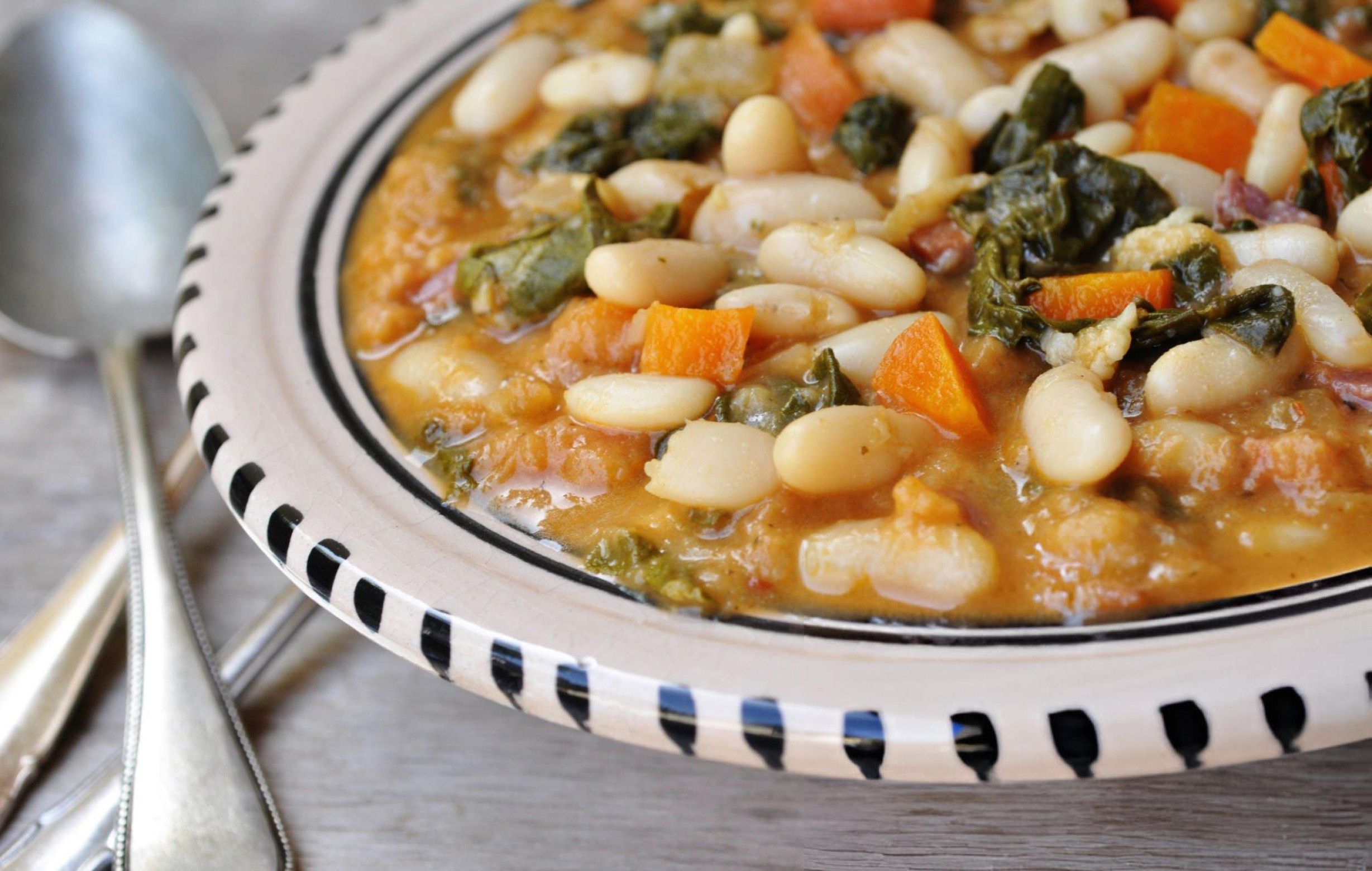
Ribollita White Bean Stew with carrots Recipe
Hearty, comforting, and packed with rustic flavor, this Ribollita White Bean Stew turns humble ingredients into a deeply satisfying meal. Each bowl is brimming with vegetables, creamy beans, and soft bread in a rich, savory broth.
Pin
Print
Save
Servings: 6
Calories: 350kcal
Ingredients
- 3 tablespoons 45 ml extra-virgin olive oil, plus extra for drizzling
- 1 medium red onion diced (about 7 ounces; 200 g)
- 3 medium cloves garlic thinly sliced
- 1 large leek white and light green parts only, diced (about 13 ounces; 370 g)
- 4 large carrots peeled and diced (about 1 1/4 pounds; 525 g)
- 1 turnip peeled and diced (about 8 ounces; 240 g)
- 2 1/2 cups diced butternut squash peeled and seeded (about 12 ounces; 360 g)
- 3 large celery stalks diced (about 8 ounces; 240 g)
- 1 bunch lacinato kale stemmed and roughly chopped (about 6 ounces; 170 g)
- Water
- 1 bouquet garni a small bundle of fresh herbs such as thyme, parsley, rosemary, oregano, and bay leaf
- 2 cups cooked white beans such as cannellini, navy, or cranberry
- 1 cup bean cooking liquid or water if using canned beans
- 1/4 pound 110 g fresh or day-old rustic crusty bread, cut into 1-inch cubes
- Kosher salt and freshly ground black pepper to taste
- Grated Parmigiano Reggiano for serving (optional)
Instructions
- In a large Dutch oven or heavy-bottomed soup pot, warm the olive oil over medium heat. Add the sliced garlic and sauté gently until fragrant and just beginning to turn golden—watch carefully to avoid burning.
- Stir in the diced onion, leek, carrots, celery, squash, and turnip. Cook, stirring occasionally, until the vegetables begin to soften slightly, about 5 minutes. Keep the heat moderate to prevent browning, allowing the vegetables to gently sweat and release their aromas.
- Pour in enough water to barely cover the vegetables, approximately 6 cups (1.5L). Add the chopped kale and the bouquet garni. Increase the heat to bring the mixture to a gentle simmer. Once it begins bubbling, reduce to a low simmer and cook uncovered for about 25 minutes, or until all the vegetables are meltingly tender.
- Next, add the cooked beans along with their reserved cooking liquid (or water, if using canned beans). Stir in the cubed bread, mixing thoroughly so it absorbs the broth. Simmer for an additional 15 minutes, stirring occasionally. The bread will begin to break down, thickening the stew into a rustic, hearty consistency. If the mixture thickens too much, add water in 1/2-cup increments to loosen it to your desired texture.
- Season generously with salt and freshly cracked black pepper. The finished ribollita can be served in one of two ways: as a thick, chunky soup with visible vegetables and broth, or cooked down further until it resembles a dense porridge.
- For a unique variation, spoon some of the thickened stew into a nonstick 8-inch skillet greased with a bit of olive oil. Cook over medium-high heat, stirring frequently, until the mixture binds together into a golden, pan-seared cake. Carefully flip it if desired and serve browned-side up for a crispy twist.
- No matter how it's served, finish each bowl or slice with a generous drizzle of good-quality olive oil, freshly ground black pepper, and a sprinkle of Parmigiano Reggiano, if using.
Nutrition
Calories: 350kcal
Did you make this recipe?Want more delicious recipes like this? Follow us on Pinterest for daily inspiration! Click here to Follow me on Pinterest @feaztcom